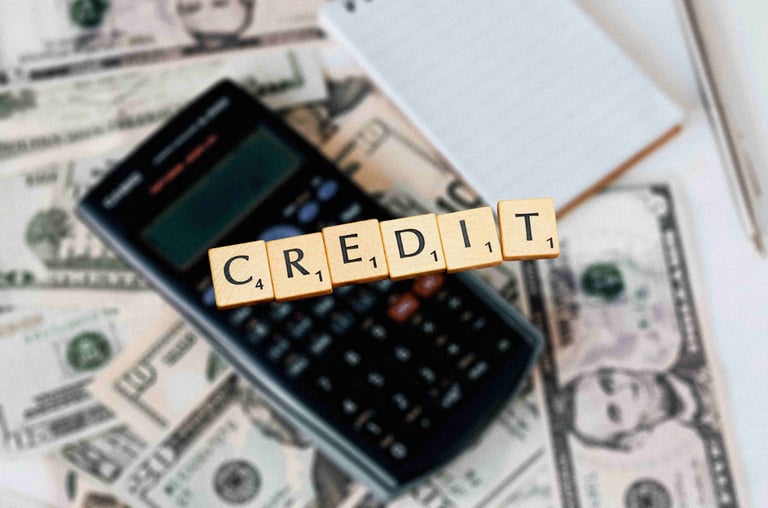
Easily Understand Your Finances With The Financial Health Check Template Today
How to Improve Your Credit Score as a Small Business Owner
Having a good credit score is crucial for business loans. Learn what a credit score is and how to improve yours with tips on payments, credit utilization, and more.
BUSINESSINVESTINGBUDGETINGDEBT
David Kindness, CPA
7/23/2024



How to Improve Your Credit Score as a Small Business Owner
Updated on July 22, 2024
Written by David Kindness, CPA
Why you can trust Your Creative CPA
Our content is written, edited, or both by industry experts who are creative entrepreneurs just like you. Learn more.
Building a good credit score is essential for both individuals and small business owners. Your credit score isn't just a number on a screen - it's an indicator of your ability to receive loans from banks or financial institutions, like auto loans, home mortgages, business property loans, lines of credit, credit cards, and more.
A good credit score gives you more financial freedom in both life and business, allowing you to take out loans and pay lower interest rates. A bad credit score can mean getting denied loans and paying higher interest rates, making it more expensive to borrow money.
If you're not happy with your credit score right now, don't worry - in this article, we'll explain what credit scores are, how they're used, and the steps you can take to improve yours starting today.
Fast Facts About Credit Scores
Your credit score is a number that reflects your creditworthiness, or your ability to take out loans and repay them.
Lenders use your credit score to decide if they'll give you a loan and what interest rate you'll pay.
There are several ways to improve your credit score, including making on-time payments and keeping your credit utilization low.
A good credit score can help you qualify for better loan rates and save money on financing.
What is a Credit Score?
Your credit score is a three-digit number that lenders like banks and financial institutions use to assess whether or not they'll approve you for a loan. It's based on your credit history, which includes information about your borrowing habits, such as your payment history, credit card balances, the types of credit you have, and more.
Credit scores are determined by one of three major credit bureaus: Experian, Equifax, and TransUnion. Each bureau maintains a separate credit report on you, and your credit score may vary slightly between them. Your credit score is also called your FICO score.
What is a Good Credit Score?
Credit scores can range from 300 at the low end to 850 at the high end. To simplify these ratings, credit scores are grouped into ranges, which include exceptional, very good, good, fair, and poor. Below are the five ranges that credit scores fall into:
Exceptional (800+): This is the highest possible score and qualifies you for the most favorable loan terms.
Very Good (740-799): This is a strong score that qualifies you for the best loan rates and terms.
Good (670-739): This is a desirable score that allows you to qualify for most loans with reasonable interest rates.
Fair (580-669): This allows you to qualify for some loans but may still come with higher interest rates.
Poor (300-579): This makes it difficult to qualify for loans and often comes with high interest rates.
For business owners, a good credit score is typically considered to be in the "Good" or higher range (670+).

"Building your credit score is an important step in achieving financial freedom for you and your creative business. Increasing your credit score might sound like an impossible challenge, but it's easier than you might think. You just need the courage to take the first step."



Credit Score Factors
Credit bureaus use a number of factors to determine your credit score, each of which plays a percentage role in their decision. Each credit bureau may use a slightly different model, but they're all likely to use the same major factors. They feed these factors into a formula and it generates a 3-digit number in the range of 300 to 850, which represents your creditworthiness to banks and financial institutions. The factors credit bureaus consider are as follows:
Payment History (35%)
Your payment history is the most important factor in determining your credit score. Your payment history is the bills you've historically owed (generally credit card balances) and how you've paid them. If you've historically paid bills on time and in full, then your payment history will be positive. You can maintain a favorable payment history by understanding your credit card's deadlines and by paying the card off in full on the deadline.
We also recommend setting up autopay, so that your credit card balance is always paid off on time. Make sure you choose to pay off the statement balance in your auto-pay settings (not the minimum payment amount).
Your payment history accounts for 35% of your credit score, so make sure you always pay on time.
Credit Utilization (30%)
This is the amount of credit you're using compared to your credit limit. The most common driver of this factor is credit card debt. For example, if the combined credit limit of all your credit cards is $10,000, and your average credit card balance is $4,000, then your credit utilization is 40%.
Lower is better, and credit bureaus like when you keep your credit utilization under 30%. To do this, you can either pay off your credit card more frequently, request a credit limit increase from your bank, or pay off your credit cards before your bank sends a report to the credit bureau, which is generally 10 days before your credit card due date each month. Then pay off your credit card again on the card's due date.
Credit utilization accounts for 30% of your credit score, so make sure you pay attention to your credit utilization.
Length of Credit History (15%)
The longer you have credit accounts open in good standing (meaning paid off on time), the better. You generally don't have a ton of control over this factor, but if you don't already have a credit history, you may want to open a credit card soon. Once you have it, use it on your normal purchases. If you don't want to use it on large purchases, then use it on small items like your morning cup of coffee, and set up auto-pay so it's always paid off on time. Not only will this give you a credit history, but it will also give you a low credit utilization - both of which will help improve your credit score.
The length of your credit history accounts for 15% of your credit score, so opening an account sooner rather than later might be advantageous.
Credit Mix (10%)
Having a mix of credit cards, loans, and lines of credit can help your score. This factor may be difficult to control and could get you into trouble if not utilized correctly, so approach with caution. Don't take out any loans you can't afford. Your credit mix includes things like credit cards, auto loans, mortgages, property loans, lines of credit, delayed payment services (like karma and afterpay), and others.
Your credit mix accounts for 15% of your credit score, so make sure you pay attention to your credit utilization.
New Credit Inquiries (10%)
Applying for too much credit in a short period of time can lower your credit score because the more loans a person currently has, the more risky it is to loan more money to that person. As a result, it's important to plan new credit inquiries thoughtfully. If you want to open multiple credit cards, consider opening them 6 months to 1 year apart, rather than in frequent succession. If you bought a new car and used an auto loan 2 months ago, consider waiting a little while to open a new credit card.
New credit inquiries account for 10% of your credit score, so make sure you pay attention to your credit utilization.
How to Improve Your Credit Score While Staying Creative
Improving your credit score might feel impossible, but it's probably easier than you think. With a few simple and quick strategies, you'll be empowered to build your credit score over time.
Use the following steps to improve your credit score while staying creative:
Make all loan and credit card payments on time. Set up autopay on your credit card accounts to make this process simple and easy.
Pay down credit card balances throughout the month to reduce your credit utilization. This can take as little as a few minutes per week.
Don't close old credit card accounts, even if you don't use them. Instead, either leave them alone or use them for small, recurring purchases, like coffee or your Spotify subscription. Make sure you set up autopay so it's always paid off on time!
Apply for new credit only when necessary, and don't apply for new credit too frequently. Credit cards you apply for should have benefits you'll actually use and a healthy signup bonus, like travel points or cash incentives.
Check your credit reports regularly (at least once per quarter, but ideally once a month) for errors and dispute them if necessary.
A bad credit score can make it difficult and expensive to secure financing for your business, but a good credit score can improve your financial freedom. By using the five strategies discussed above, you'll be empowered to take control of your credit score and build a strong financial future for your business, all while staying focused on your creative business goals.
Frequently Asked Questions (FAQs)
Can I get a free copy of my credit report?
Yes, you can request a free credit report from each of the three major credit bureaus: Experian, EquiFax, and TransUnion. Simply visit their websites to learn more and request your credit score.
How long does it take to improve my credit score?
It can take several months to a year to see significant improvement in your credit score, but even small changes can make a difference. This might sound like a long time, but in the long run of your life, it's actually fairly quick. For example, a mortgage generally takes 30 years to pay off, so 1 year to improve your credit is only 1/30th of that time.
What if I have bad credit?
Even with bad credit, there are steps you can take to improve your score. Start by focusing on making all your payments on time and paying down debt. You should also create and stick to a budget, with a focus on limiting unnecessary expenses. Saving money will help you pay off debt on time and in full, improving your credit score starting right away.
What are hard credit inquiries?
Hard inquiries are inquiries made by lenders when you apply for a loan or credit card. They can temporarily lower your credit score.
Should I use a co-signer?
A co-signer can help you qualify for a loan if you have poor credit. However, it's important to understand the responsibility. If you miss payments, it will hurt both your credit score and your co-signer's score. Make sure you can afford the loan payments before involving a co-signer
What are soft credit inquiries?
Soft inquiries are inquiries made on your credit report that typically don't affect your score. These can occur when you check your own credit report, a potential employer checks your credit history for a pre-employment background check, or a credit card issuer pre-approves you for an offer.
Disclaimer: the information provided in this article is for educational purposes only and does not constitute tax, accounting, investing, legal, or financial advice. The information in this article does not take into account your unique financial or business situation or goals, and YCCPA cannot be responsible for reader's financial decision-making. YCCPA's goal is to educate and support you on your creative business journey.
Written by David Kindness, CPA
David is a CPA (Certified Public Accountant) and professional photographer, videographer, and designer based in San Diego, California. Learn more.




Supported by Ads
Your Creative CPA is supported by the ads you may see in our articles and guides. These ads help us serve creatives like you.



financial wisdom for creatives, by creatives

Created by David Kindness
© 2025 Your Creative CPA | Terms
type1wild.com partner
Exclusive guides and tools for creatives, right to your inbox.









